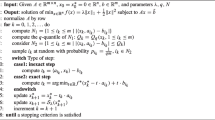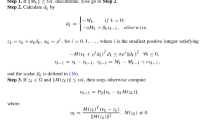Abstract
In this paper, a Joint Early Detection and Early Stopping (JEDES) approach for effectively reducing the complexity of turbo decoding with negligible performance loss is proposed. It combines the effectiveness of both early detection and early stopping techniques. Our simulation results demonstrated that the proposed JEDES scheme based on cyclic redundancy check and trellis splicing can achieve a complexity saving of 15% to 20% at practical bit error rates over the idealized GENIE stopping scheme, which is widely accepted as the theoretically best possible early stopping scheme.
Similar content being viewed by others
References
Shibutani, H. Suda, F. Adachi. Reducing average number of turbo decoding iterations. IEE Electronics Letters, 35(1999)9, 701–702.
T. M. N. Ngatched and F. Takawira. Simple stopping criterion for turbo decoding. IEE Electronics Letters, 37(2001)22, 1350–1351.
R. Y. Shao, S. Lin, M. C. P. Fossorier. Two simple stopping criteria for turbo decoding. IEEE Trans. on Commun., 47(1999)8, 1117–1120.
Y. Wu, B. D. Woerner, W. J. Ebel. A simple stopping criterion for turbo decoding. IEEE Commun. Lett., 4(2000)8, 258–260.
J. Hagenuaer, E. Offer, L. Papke. Iterative decoding of binary block and convolutional codes. IEEE Trans. on Inform. Theory, 42(1996)2, 429–445.
K. Gracie, S. Crozier, P. Guinand. Performance of an MLSE-based early stopping technique for Turbo codes. in 60th IEEE Vehicular Technology Conference 2004-Fall (VTC’2004-Fall), Loss Angeles, California, USA, September 26–29, 2004, vol. 3, 2287–2291.
Ma Zheng, Wai Ho Mow, Fan Pingzhi. On the complexity reduction of turbo decoding for wideband CDMA. IEEE Trans. on Wireless Commun., 4(2005)2, 353–356.
Brendan J. Frey, Frank R. Kschischang. Early detection and trellis splicing: reduced-complexity iterative decoding. IEEE Journal on Selected Areas in Commun., 16(1998)2, 153–159.
Ma Zheng, Fan Pingzhi, Wai Ho Mow. An effective stopping scheme for reduced-complexity iterative decoding of short-frame turbo codes. Proceedings of International Conference on Communications, Circuits and Systems, Hong Kong, May 2005, vol. 1, 27–30.
Patrick Robertson, Emmanuelle Villebrun, Peter Hoeher. A comparison of optimal and sub-optimal MAP decoding algorithms operating in the log domain. in Proc. IEEE ICC’95, Seattle, USA, June 1995, 1009–1013.
Author information
Authors and Affiliations
Corresponding author
Additional information
Supported by the National Natural Science Foundation of China (NSFC) and the Research Grants Council of Hong Kong (RGC) joint research scheme (No.60218001/N_HKUST617-02 and No.60272070).
Communication author: Ma Zheng, born in 1977, male, Ph.D. The Institute of Mobile Communications, Southwest Jiaotong University, Chengdu 610031, China.
About this article
Cite this article
Ma, Z., Fan, P. & Wai, H.M. Joint Early Detection and Early Stopping scheme for complexity reduction of turbo decoding. J. of Electron.(China) 24, 316–320 (2007). https://doi.org/10.1007/s11767-006-0013-9
Received:
Revised:
Published:
Issue Date:
DOI: https://doi.org/10.1007/s11767-006-0013-9




